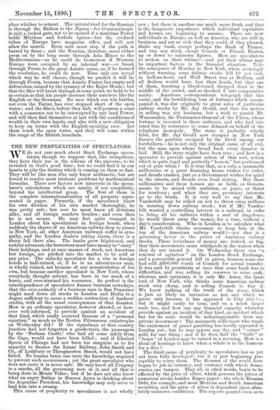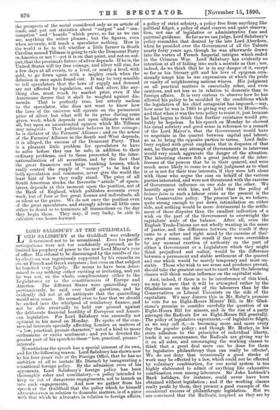THE NEW PERPLEXITIES OF SPECULATORS.
NIVE do not care much about Stock Exchange specu- lators, though we suppose that, like mosquitoes, they have their use in the scheme of the universe, to be revealed in God's good time ; but we could find it in our hearts to pity the destiny which is coming on them so fast. They will be like men who only know arithmetic, but are forced to resolve most intricate problems by mathematical formulas. Three new factors now intervene in the specu- lator's calculations which are nearly, if not completely, beyond his intellectual grasp. The first of them is the complete internationalisation of all property repre- sented in paper. Formerly, if the speculator knew his own division of his own market thoroughly, he was pretty safe ; but now he must know all divisions alike, and all foreign markets besides ; and even then he is not secure. He may feel quite tranquil in London about his speculations in foreign bonds, when suddenly the shares of an American railway drop to pieces in New York, all other American railways suffer in sym- pathy, and the London dealers taking alarm, there is a sharp fall there also. The banks grow frightened, and restrict advances, the borrowers must have money to " carry " their holdings, and at once masses of stock, not American but foreign, are pitched into the market to be sold at any price. The unlucky speculator for a rise in foreign bonds is half-ruined, or, if he is an adventurous man, is wholly ruined, not because of any miscalculation of his own, but because another speculator in New York, whom everybody thought solvent, has been in too much of a hurry, and over-strained his resources. So perfect is the interdependence of speculative finance business nowadays, that the over-audacity of a business man in San Francisco might send down all stocks in London and Berlin to a degree sufficient to cause a sudden contraction of bankers' credits, with all the usual consequences of that disaster. How is an ordinary speculator, however shrewd, or how- ever well-informed, to provide against an accident of that kind, which really occurred because of a " personal equation," as much as the Norton Fitzwarren catastrophe on Wednesday did ? If the signalman at that country junction had not forgotten a goods-train, the passengers by the Norham Castle,' who had all come safely from the Cape, would not have been killed ; and if Ichabod Specie of Chicago had not been too sanguine as to his capacity to finance the Lunar Railway, John Smith and Co., of Lothbury or Throgmorton Street, would not have failed. No human brain can carry the knowledge required to prevent such occurrences ; yet the great speculator who does not carry it is never safe. He may know all Uruguay to a ranche, all the governing men in it, and all that is being done in Monte Video ; but if he does not also know what an angry Italian in Buenos Ayres is thinking about the Argentine President, his knowledge may only serve to lead him into a swamp.
This cause of perplexity to speculators is not wholly new; there is another one much more fresh, and that is the dangerous importance which individual capitalists and houses are beginning to assume. There are now individuals in Europe, as well as America, who are still in business, and are so rich that they could, if they pleased, shake any bank, except perhaps the Bank of France, and run any stock, except Consols or French Rentes, up or down to unknown figures. How are speculators to reckon on their whims ?—and yet their whims may be important factors in the financial situation. Take the semi-panic of Monday in New York, when, seemingly without warning, some railway stocks fell 10 per cent. in half-an-hour, and Wall Street was as Bedlam, and all dealers would have lost their heads, but that one of them, bursting a blood-vessel, dropped dead in the middle of the crowd, and so shocked it into comparative sanity. American correspondents telegraph that this scene, and the bewildering loss of fortunes which accom- panied it, was due originally to great sales of particular railway stocks by Mr. Jay Gould, and that his motive in selling was not business, but a wish to punish Mr. Wanamaker, the Postmaster-General of the Union, whose fortune is invested in those railways, and who had irri- tated him by resistance to some demand on behalf of the telephone monopoly. The story is probably wholly false, for Mr. Jay Gould now occupies in New York finance the position occupied by the Devil among our forefathers,—he is not only the original cause of all evil, but the man upon whose broad back every disaster is laid. Still, the story might have been true • and how is a spectator to provide against action of that sort, action which is quite legal and perfectly " honest," but performed out of pure whim ? It is true that, as a rule, a mammoth millionaire or a great financing house wishes for order, and dreads crashes, just as a Government wishes for quiet in the streets, and dreads even local rioting. But these millionaires and these houses are as liable as Govern- ments to be seized with ambition, or panic, or thirst for territory ; and when they are, pecuniary interests go to the winds. It is very well to say that Mr. Vanderbilt may be relied on not to throw away millions in running down railway stock ; but if Mr. Vander- bilt wanted a controlling interest in a railroad, in order to bring all his railways within a sort of ring-fence, he would throw away the money, for a time, without a day's consideration. Who in London is to calculate what Mr. Vanderbilt thinks necessary to keep him at the top of the American railway world ?—yet that is a governing factor in the prices. of American railway stocks. These leviathans of money axe, indeed, so big, that their movements cause whirlpools in the waters when they do not intend it. On Wednesday there was " a. renewal of agitation " on the London Stock Exchange, and a perceptible general fall in prices, because some one had sold £600,000 worth of Consols for actual transfer_ It was said by pessimists at once that some bank was in difficulties, and was selling its reserves to raise cash ; whereas, said optimists, it is only Mr. Astor, the land- lord of New York, who thinks some American railway stock very cheap, and is selling Consols to buy it. We know nothing of the truth of the story, which is just as likely an invention as not, and which we quote only because it has appeared in City articles ; but it might easily be true, and on a much larger scale too, and how can any financial capacity whatever provide against an incident of that kind, an incident which but for its scale would be indistinguishable from any private investment ? The mammoth millionaire who wants the excitement of grand gambling has hardly appeared in London yet ; but he may appear any day, and " corner " gold, for one thing ; and if he does, half the " bulls " or " bears " of London may be ruined in a morning. How is a shoal of herrings to know when a whale is in the humour for a dive ?
The third cause of perplexity to speculators has as yet not been fully developed ; but it is just beginning per- ceptibly to worry them. The Bourses of the world have begun to job in currency, and currency with which demo- cracies can tamper. They all, in other words, begin to be affected by the price of silver, which governs the prices of numerous stocks besides Rupee paper—the whole Russian Debt, for example, and most Mexican and South American securities, and the price of silver is dependent upon abso- lutely unknown conditions. The experts quarrel even as to the prospects of the metal considered only as an article of trade, and put out statistics about "output" and " con- sumption " and " hoards " which prove, so far as we can see, anything the writer pleases ; but the figures, even when accurate, will teach a speculator nothing. How in the world is he to tell whether a little farmer in South Carolina named Tillman is going to rule the Democrat Party in America or not P—yet it is on that point, and not on out- put, that the proximate future of silver depends. If he is, the United States will try free coinage, and silver will rise, for a. few days at all events, to a level, or nearly a level, with gold, to go down again with a mighty crash when the delusion is once again found out. It may be very sensible to tell speculators that the laws of supply and demand are not affected by legislation, and that silver, like any- thing else, must reach its market price, even if the Americans decree that it shall be weighed against dia- monds. That is perfectly true, but utterly useless to the speculator, who does not want to know how the laws of the universe will operate on the permanent price of silver, but what will be its price during some given week, which depends not upon ultimate truths at all, but upon an uninstructed opinion which Mr. Tillman may misguide. That politician believes in free coinage ; he is dictator of the Farmers' Alliance ; and on the action of the Farmers' Alliance in the South and West depends, it is alleged, the success of the Democrat Party. That is a pleasant little problem for speculators to have to solve before they can be safe, in addition to their ordinary problems, and to those presented by the inter- nationalisation of all securities, and by the fact that the great financiers and large banking houses, which really control the supply of " money " to be had for both speculation and commerce, never give the world the least hint of how they really stand. The price of all South American stocks, the favourite " article " of specu- lators, depends at this moment upon the position, not of the Bank of England, which publishes accounts every -week, but of four or five great houses and individuals, all as silent as the grave. We do not envy the position even of the great speculators, and strongly advise all little ones -either to desist or to terminate all transactions on the day they begin them. They may, if very lucky, be able to calculate two hours forward.



















































 Previous page
Previous page